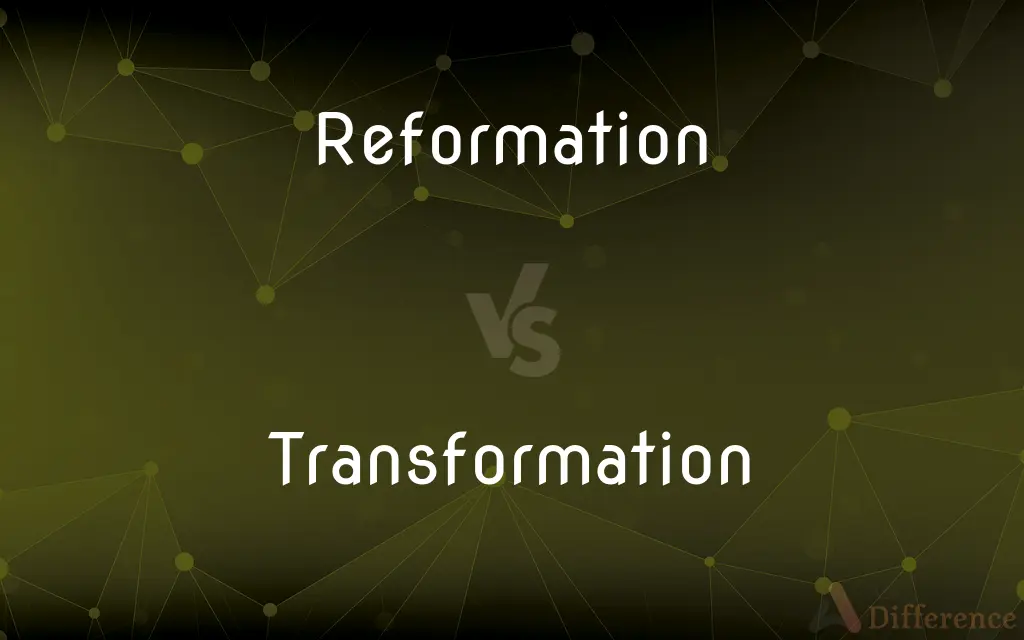Reformation vs. Transformation — What's the Difference?
Edited by Tayyaba Rehman — By Fiza Rafique — Updated on October 27, 2023
Reformation involves making changes to improve something, while Transformation indicates a complete change in nature, form, or appearance.

Difference Between Reformation and Transformation
Table of Contents
ADVERTISEMENT
Key Differences
Reformation typically denotes a process where alterations are made to bring about improvement or rectification. Transformation, in contrast, alludes to a profound or radical change that often results in an entity or individual becoming fundamentally different.
The word Reformation often evokes thoughts of organized movements, such as the Protestant Reformation, where the aim was to bring about religious changes. Transformation, meanwhile, can be seen in various contexts from biology, where it can mean genetic alteration, to personal growth, reflecting a deep change in character or perspective.
In a societal context, Reformation might relate to changes in laws, regulations, or systems to make them more just or efficient. On the other side, Transformation might refer to a society entirely changing its foundational principles or undergoing a cultural revolution.
A key distinction lies in the depth and nature of the change. Reformation involves refining or improving an existing structure or system. Transformation, however, transcends mere improvements and denotes a complete overhaul or metamorphosis of the original state.
Comparison Chart
Definition
Process of making changes for improvement.
Complete change in nature, form, or appearance.
ADVERTISEMENT
Historical Context
Often linked with religious and societal reforms.
Can denote profound changes in various contexts.
Depth of Change
Refinement or rectification of existing state.
Overhaul or complete metamorphosis.
Result
Improved or corrected version of the original.
Often results in something fundamentally different
Usage Context
Typically specific, targeting certain aspects.
Broader and can apply to various scenarios.
Compare with Definitions
Reformation
A religious movement aiming for change in beliefs.
The Protestant Reformation changed the course of history.
Transformation
A marked change in circumstances.
The city's Transformation over the decades is commendable.
Reformation
Making changes to a system for better results.
The education sector is in dire need of Reformation.
Transformation
A complete change in form or appearance.
The caterpillar's Transformation into a butterfly is fascinating.
Reformation
Correction of wrongs or errors.
His personal Reformation came after deep introspection.
Transformation
Alteration in nature or character.
His journey was one of personal Transformation.
Reformation
Renewal or revival of certain principles or methods.
The artistic Reformation in the 20th century led to modern art.
Transformation
Genetic modification of an organism.
Scientists achieved the Transformation of bacteria using plasmids.
Reformation
The act of improving by rectifying errors.
The legal system underwent a much-needed Reformation.
Transformation
The act or an instance of transforming
Her difficult transformation of the yard into a garden.
Reformation
The Protestant Reformation (alternatively and sometimes named the Protestant Revolution or European Reformation), was a major movement within Western Christianity in 16th-century Europe that posed a religious and political challenge to the Catholic Church, and in particular to papal authority, arising from what were perceived to be errors, abuses, and discrepancies by the Catholic Church. The Reformation was the start of Protestantism and the split of the Western Church into Protestantism and what is now the Catholic Church.
Transformation
The state of being transformed
Impressed by the transformation of the yard.
Reformation
The act of reforming or the state of being reformed.
Transformation
A marked change, as in appearance or character, usually for the better
Recent transformations in the format of the publication.
Reformation
Reformation A 16th-century movement in Western Europe that aimed at reforming some doctrines and practices of the Roman Catholic Church and resulted in the establishment of the Protestant churches.
Transformation
Replacement of the variables in an algebraic expression by their values in terms of another set of variables.
Reformation
An improvement (or an intended improvement) in the existing form or condition of institutions or practices, etc.; intended to make a striking change for the better in social, political or religious affairs or in the conduct of persons or operation of organizations.
Transformation
A mapping of one space onto another or onto itself.
Reformation
(law) Change or correction, by a court in equity, to a written instrument to conform to the original intention of the parties.
Transformation
(Linguistics) An operation or rule that changes one linguistic structure (especially a syntactic structure) into another, as by the merger, relocation, or deletion of one of its constituents.
Reformation
The act of reforming, or the state of being reformed; change from worse to better; correction or amendment of life, manners, or of anything vicious or corrupt; as, the reformation of manners; reformation of the age; reformation of abuses.
Satire lashes vice into reformation.
Transformation
The change undergone by an animal cell upon infection by a cancer-causing virus.
Reformation
Specifically (Eccl. Hist.), the important religious movement commenced by Luther early in the sixteenth century, which resulted in the formation of the various Protestant churches.
Transformation
The introduction of DNA from one cell into another by means of a bacteriophage or one of a variety of chemical or physical methods.
Reformation
Improvement (or an intended improvement) in the existing form or condition of institutions or practices etc.; intended to make a striking change for the better in social or political or religious affairs
Transformation
The act of transforming or the state of being transformed.
Undergo a radical transformation
Reformation
A religious movement of the 16th century that began as an attempt to reform the Roman Catholic Church and resulted in the creation of Protestant churches
Transformation
A marked change in appearance or character, especially one for the better.
Reformation
Rescuing from error and returning to a rightful course;
The reclamation of delinquent children
Transformation
(mathematics) The replacement of the variables in an algebraic expression by their values in terms of another set of variables; a mapping of one space onto another or onto itself; a function that changes the position or direction of the axes of a coordinate system. Category:en:Functions
Transformation
(linguistics) A rule that systematically converts one syntactic form into another; a sentence derived by such a rule.
Transformation
(genetics) The alteration of a bacterial cell caused by the transfer of DNA from another, especially if pathogenic.
Transformation
The transition from the apartheid era to a multiracial democracy in South Africa.
Transformation
The act of transforming, or the state of being transformed; change of form or condition.
Transformation
Any change in an organism which alters its general character and mode of life, as in the development of the germ into the embryo, the egg into the animal, the larva into the insect (metamorphosis), etc.; also, the change which the histological units of a tissue are prone to undergo. See Metamorphosis.
Transformation
Change of one from of material into another, as in assimilation; metabolism; metamorphosis.
Transformation
The imagined possible or actual change of one metal into another; transmutation.
Transformation
A change in disposition, heart, character, or the like; conversion.
Transformation
The change, as of an equation or quantity, into another form without altering the value.
Transformation
A qualitative change
Transformation
(mathematics) a function that changes the position or direction of the axes of a coordinate system
Transformation
A rule describing the conversion of one syntactic structure into another related syntactic structure
Transformation
(genetics) modification of a cell or bacterium by the uptake and incorporation of exogenous DNA
Transformation
The act of changing in form or shape or appearance;
A photograph is a translation of a scene onto a two-dimensional surface
Transformation
A shift from one state to a radically different one.
The company's digital Transformation accelerated its growth.
Common Curiosities
Can a personal experience lead to Transformation?
Yes, personal experiences, especially profound ones, can lead to personal Transformation.
In what context is Transformation often used in biology?
In biology, Transformation often refers to the genetic modification of an organism.
Can Reformation lead to Transformation?
Yes, cumulative reforms or profound Reformation can eventually lead to Transformation.
Can Transformation be both physical and intangible?
Yes, Transformation can refer to physical changes like appearance or intangible changes like mindset.
What does Reformation typically aim at?
Reformation aims at making changes to improve or rectify something.
Is Reformation limited to societal or religious contexts?
No, Reformation can apply to personal, organizational, societal, or various other contexts.
Does Reformation always indicate a positive change?
Typically, Reformation implies positive changes for improvement, but context can vary the perception.
Can Transformation be a natural process?
Yes, like the Transformation of a caterpillar into a butterfly or a seed into a plant.
Can a change in perspective be considered a Transformation?
Yes, a profound shift in perspective or worldview can be seen as a personal Transformation.
How does Transformation differ from Reformation?
Transformation indicates a complete change in nature, form, or appearance, while Reformation is about improvement or correction.
Is Reformation always driven by external factors?
Not always. Reformation can be driven by internal realizations or external pressures.
Can you give a historical example of Reformation?
The Protestant Reformation in the 16th century aimed at religious changes within Christianity.
What might drive the need for Reformation in an organization?
Inefficiencies, outdated practices, or the need to adapt to changing circumstances might drive Reformation.
What's the link between Reformation and change?
Reformation is a type of change, specifically targeting improvement or correction.
How does digital Transformation affect businesses?
Digital Transformation can modernize operations, improve efficiency, and enhance customer experience for businesses.
Share Your Discovery

Previous Comparison
Chap vs. Rap
Next Comparison
Harpoon vs. SpearAuthor Spotlight
Written by
Fiza RafiqueFiza Rafique is a skilled content writer at AskDifference.com, where she meticulously refines and enhances written pieces. Drawing from her vast editorial expertise, Fiza ensures clarity, accuracy, and precision in every article. Passionate about language, she continually seeks to elevate the quality of content for readers worldwide.
Edited by
Tayyaba RehmanTayyaba Rehman is a distinguished writer, currently serving as a primary contributor to askdifference.com. As a researcher in semantics and etymology, Tayyaba's passion for the complexity of languages and their distinctions has found a perfect home on the platform. Tayyaba delves into the intricacies of language, distinguishing between commonly confused words and phrases, thereby providing clarity for readers worldwide.














































